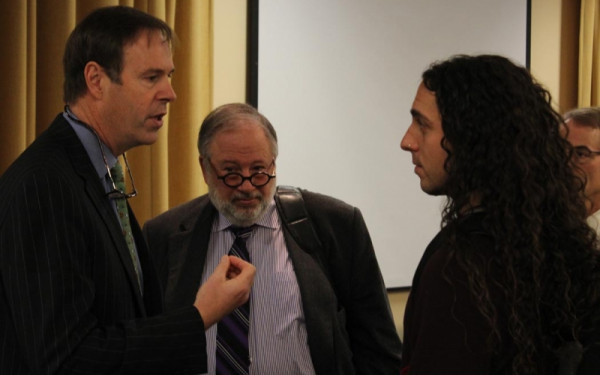Concordia Board of Governors Want More Money and More Security
An Update From the Latest BoG Meeting
After years of budget cuts, Concordia administration has finally had enough.
The university is looking to get more funding from the Quebec government, saying they need to find a way to reduce their increasing deficit.
This became a topic of discussion at a recent Board of Governors meeting on March 8.
Since 2010, the most Concordia has been able to borrow from the Quebec government as been $700 million. But they want to increase that amount to $1 billion.
The Quebec Government is considering that proposal right now. From 2016 to 2017, the university projected they will run a deficit of $6.3 million. That’s better than the year before, when there was a $9.1 million deficit.
For the 2016-2017 fiscal year, the Quebec Government made a small increase of 0.8 per cent in funding to Concordia. But according to the highlights from Concordia’s budget for the year so far, “this modest increase, combined with limited increases in revenue from grants and tuition fees, does not create much room to maneuver.”
In December, the federal and provincial government, with the help of private donors, pledged to fund $1.1 billion to Quebec universities Polytechnique Montréal, Université de Montréal, and HEC Montréal under their post-secondary institution strategic investment fund. Concordia was left out. But President of Concordia, Alan Shepard is hopeful that they will receive more funding in the future.
“If you’ve been reading the newspapers, you know the government is pledging itself to increase the funding to higher education in Quebec. We certainly hope that’s the case,” he said.
The full budget has not been released yet, since the fiscal year ends on April 30.
One of the Board’s undergraduate student representative Terry Wilkings—also the former Concordia Student Union general coordinator—raised concerns about how much the university can accomplish, given increasing deficit. He asked specifically how Concordia was going to manage to fund the goals addressed in their nine strategic directions.
The nine strategic directions outline goals Concordia plans to achieve in the upcoming years, with plans such as doubling their research and experimenting more with new teaching methods through co-op placements and internships.
Shepard said that they hope they’ll be able to do that with the help of the Quebec Government.
“Obviously, we’re designing scenarios with a major unknown,” said Carr. “The unknown is the level of government investment we might anticipate this year.”
Provost and Vice-President of Academic Affairs, Graham Carr, said despite the deficit, Concordia would still prioritize investments in academic endeavors over anything else, including investments into the goals outlined in their nine strategic directions.
When one governor mentioned that they want to increase student recruitment by working with CEGEPs, Lucinda Marshall-Kiparissis, another undergraduate representative for the Board and current CSU General Cordinator, reminded them that if they wanted Montreal to continue holding the spot as the number one city for students, tuition needs to remain affordable.
“They seem very perturbed at the idea of students interacting with them.” —Lucinda Marshall-Kiparissis
In mid-February, Montreal won the spot as the best student city on the QS Best Student Cities ranking. The ranking comes out of Top Universities, a company based out of London.
Increased Security Presence
Security presence was amped up around the GM building on the day of the meeting. Access to the fourth floor of the GM building, where the board meeting is held, was blocked by security and only members of the board were allowed to go up.
Wilkings asked Shepard if this procedure was going to be the new normal for Board of Governors meetings.
At the last Board meeting on Dec. 14, there was an equal amount of security. That time, it was in reaction to protests students were holding against Concordia’s proposed tuition fee hikes for international students.
At the most recent Board of Governors meeting, Divest Concordia came to hand out postcards which were signed by student and outlined arguments for why Concordia needs to take their investments out of fossil fuels.
Two Divest members, Alex Leonard and Kya Ringland, tried to hand them to members of the Board while they were walking into their meeting, but security wouldn’t let them in.
“If you’re representing the Concordia community, and you’re making decisions on their behalf, you should have a clear dialogue with that community,” said Ringland.
Shepard couldn’t specify if increased security will become a trend, but said it was a possibility. “We’ll see,” he commented.
He explained their decision to add increased security to protect the Board came in reaction to the bomb threats that were made against Concordia on March 1. Police had advised the school that there might be copycat incidents on campus.
But Wilkings and Marshall-Kiparissis are concerned about how it will affect students, saying it will only help to further an atmosphere of fear.
Marshall-Kiparissis also emphasized that it was a double standard.
“They get to be the one’s who are protected,” said Marshall-Kiparissis, in an interview after the meeting. “These external members who come and make these very important decisions, but don’t spend that much time on campus. We’re valuing their sense of safety more.”
Similar protocol has been taken before to ease the worries of an administrator. Two days after bomb threats were made to Concordia and its Muslim community, the Dean of Students made the decision to move a Concordia Council on Student Life meeting to the Loyola campus out of concern for safety on the downtown campus.
Marshall-Kiparissis also said it was troubling since if it was the new norm, it would strengthen the separation between the Concordia community-at-large and the Board of Governors, who form the highest decision-making body at Concordia.
Board of Governors meetings are already barred for anyone who isn’t a governor, and the only way to view their meetings is through a live stream in a separate room. Archived footage of the past meetings is only accessible by in-person appointments.
“They seem very perturbed at the very idea of students interacting with them,” said Marshall-Kiparissis.

_900_675_90.jpg)


web_600_375_90_s_c1.jpg)

